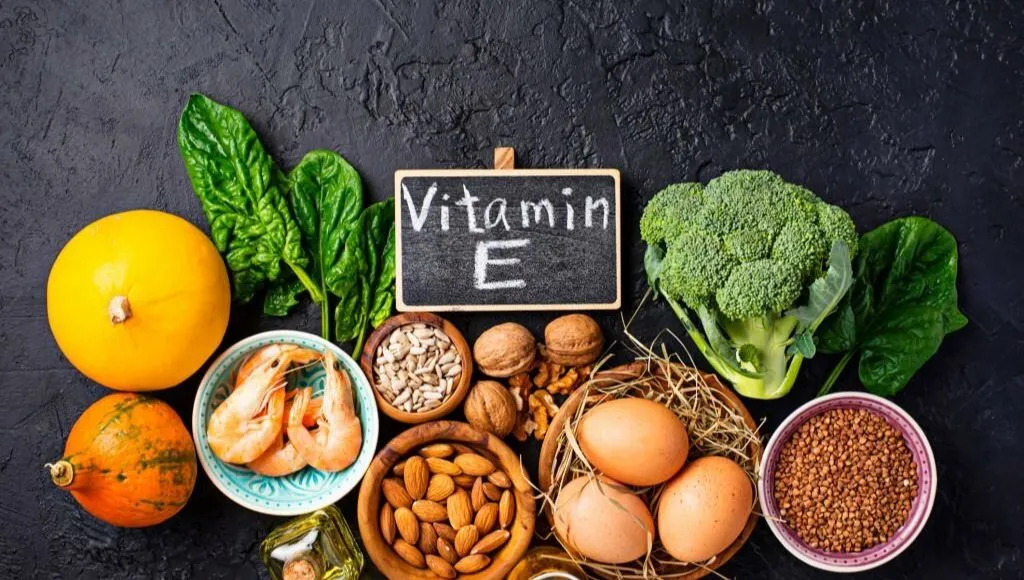Vitamin E is an antioxidant that plays a crucial role in maintaining healthy skin and hair. It is a fat-soluble vitamin that is a potent antioxidant. Not only is it important for our immune system but also cardiovascular health, skin health, neurological health, and hormonal balance.
Its implication in the field of hair care is being studied closely and needs a closer look.
How Does Vitamin E Contribute To Hair Growth?
Vitamin E contributes to hair growth in multiple ways including-
1. Scalp Health- Vitamin E’s primary function includes neutralizing the free radicals that cause oxidative stress for the hair follicles. As their number goes down, the hair could flourish on the scalp. Additionally, skin conditions like dandruff and psoriasis often limit hair growth and Vitamin E fights them off to make the environment better.
2. Blood Circulation- Vitamin E supports blood circulation. Improved blood flow ensures that hair follicles receive an adequate supply of oxygen and nutrients that they need to grow. Our scalp might also pick up toxins from its environment which can be removed with improved circulation.
3. Moisture Retention- The major hindrance to hair growth is the lack of moisture. Vitamin E makes sure the scalp is evenly hydrated and thus prevents dryness or flakiness of the scalp. A well-hydrated hair will display a healthy growth cycle thereby curbing irritation and itching.
4. Antioxidant Properties- Vitamin E’s anti-oxidant properties farewell known and it does the same for the hair as well. Hairfall decreases and the hair follicles find the strength to root themselves in the scalp.
5. Hair Texture Improvement- While not directly linked to hair growth, Vitamin E could improve the hair texture by reducing split ends and breakages leading to hair growth.
How To Incorporate Vitamin E Into Your Haircare Routine?
There are multiple ways in which you could incorporate Vitamin E in your hair care schedule which could be orally or topically.
- Diet- The easiest way to include Vitamin E is to consume it through foods. It could include almonds, sunflower seeds, spinach, avocados, and olive oil. A well-balanced diet should not be overlooked and be the first step towards attaining healthy hair.
- Supplements- In case you don’t get enough Vitamin E from the foods you consume, you could always depend on supplements that are available in the market. However, to ascertain the dosage, please consult a healthcare professional.
- Topical Application- Vitamin E can also be directly applied to the scalp. You either use pure Vitamin E oil or look for hair care products that have Vitamin E in them. To apply the oil, you need to warm it and leave it overnight. You can wash your hair the next day.
- DIY Hair Masks- You can also make DIY hair masks with Vitamin E-rich ingredients to enjoy their benefits. For instance, you could mix the oil with coconut oil for moisturizing benefits. To get a hydrating effect, add Vitamin E to the Aloe vera gel. Additionally, you could also add some to your regular conditioner in case it lacks some.
Overconsumption of Vitamin E
When it comes to overconsumption of Vitamin E, especially through supplements, it could lead to
1. Hair Loss- High levels of Vitamin E can disrupt the normal balance of other vitamins and minerals which leads to excessive hair loss.
2. Interference With The Absorption of Other Nutrients- Vitamin E is essential for hair growth but so is Vitamin K and Iron. Consuming lots of Vitamin E can limit their absorption.
3. Oily Scalp and Hair- Some individuals who don’t have oily hair might showcase an oily scalp after using excessive amounts of Vitamin E.
4. Skin Allergies or Irritation- Topical application of Vitamin E can also lead to irritation or itching in the scalp or even other parts of the skin. It is therefore important to take a patch test before applying it in copious amounts.
Conclusion
Vitamin E can certainly enhance hair growth if included in our routine but the growth cannot happen in isolation. Along with proper nutrition and exercise, you might also want to get in touch with a healthcare professional to make a proper diagnosis of your scalp and hair problems to get a comprehensive idea.

